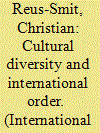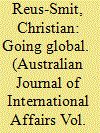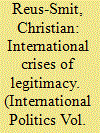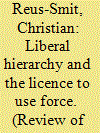|
|
|
Sort Order |
|
|
|
Items / Page
|
|
|
|
|
|
|
| Srl | Item |
| 1 |
ID:
156715


|
|
|
|
|
| Summary/Abstract |
The modern international order faces profound challenges. Power is shifting to non-Western states and diffusing to non-state actors, including transnational insurgents. This is more than a power transition: it also about culture. Western states now share the stage with powers such as China who bring their own cultural values, practices, and histories, and new forms of transnational violence are justified in the name of religious identity and belief. Some see this as a fundamental threat to modern international order, an order created by and for the West. Others see the “liberal” order as uniquely able to accommodate states and peoples of diverse cultures. How well equipped is IR to contribute to these debates? I review four recent works on the future of the modern international order, asking what conceptual, theoretical, and empirical resources they offer for understanding the relationship between cultural diversity and international order. This literature suffers from four limitations: culture is essentialized or bracketed; institutions are seen as either simple expressions of cultural values or structures that neutralize culture, with their recognition function ignored; the structural power of international orders—how they produce political and cultural subjectivities—is underappreciated; and international orders are conceived too narrowly as orders of sovereign states. To overcome these limitations, I advance a new perspective on cultural diversity and international order. International orders evolve in heterogeneous cultural contexts, and the governance of diversity is a key imperative of order building. In response, international orders develop diversity regimes: institutional norms and practices that define legitimate units of political authority, authorize certain forms of cultural difference, and relate the two. These regimes are essential to the legitimacy of international orders, but face two interrelated pressures for change: shifts in underlying material capabilities, and new claims for cultural recognition, often rooted in grievances against past or prevailing forms of recognition.
|
|
|
|
|
|
|
|
|
|
|
|
|
|
|
|
| 2 |
ID:
183512


|
|
|
|
|
| Summary/Abstract |
Australian International Relations (IR) has grown dramatically in recent years, but more importantly, it has internationalised and diversified. Australian scholars areleading voices in many of the field’s central debates, addressing a multiplicity of questions, empirical and theoretical. Globally, however, the field of IR is at a crossroad. It is challenged to acknowledge its Eurocentric origins and biases, grasp the long shadow that empire casts over the international system, and shed its intellectual blinkers by drawing on non-Western ideas, practices, and historical experiences. This demands more of Australian scholars than continued international engagement: it poses far reaching questions about the field we are engaging, who we will be in this field, and the direction our contributions will nudge IR. This article explores the challenges and opportunities that ‘going global’ present. Crucially, it requires an ontological reorientation in how we conceive international relations as a domain of politics and demands a shift in normative reasoning, emphasising the ethics of recognition and hierarchy. Making these moves offers exciting opportunities for the revitalisation of the study of Australian foreign policy, enabling us to rethink the ‘foreign’ in such policy, the evolution of the ‘rules-based international order’, and the nature of ‘region’.
|
|
|
|
|
|
|
|
|
|
|
|
|
|
|
|
| 3 |
ID:
107566


|
|
|
|
|
| Publication |
2011.
|
| Summary/Abstract |
How should we understand the cultural politics that has surrounded the development of international human rights? Two perspectives frame contemporary debate. For 'cultural particularists', human rights are western artefacts; alien to other societies, and an inappropriate basis for international institutional development. For 'negotiated universalists', a widespread global consensus undergirds international human rights norms, with few states openly contesting their status as fundamental standards of political legitimacy. This article advances an alternative understanding, pursuing John Vincent's provocative, yet undeveloped, suggestion that while the notion of human rights has its origins in European culture, its spread internationally is best understood as the product of a 'universal social process'. The international politics of individual/human rights is located within an evolving global ecumene, a field of dynamic cultural engagement, characterized over time by the development of multiple modernities. Within this field, individual/human rights have been at the heart of diverse forms of historically transformative contentious politics, not the least being the struggles for imperial reform and change waged by subject peoples of diverse cultural backgrounds; struggles that not only played a key role in the construction of the contemporary global system of sovereign states, but also transformed the idea of 'human' rights itself. In developing this alternative understanding, the article advances a different understanding of the relation between power and human rights, one in which rights are seen as neither simple expressions of, or vehicles for, western domination, nor robbed of all power-political content by simple notions of negotiation or consensus. The article concludes by considering, in a very preliminary fashion, the implications of this new account for normative theorizing about human rights. If a prima facie case exists for the normative justifiability of such rights, it lies first in their radical nature-in their role in historically transformative contentious politics-and second in their universalizability, in the fact that one cannot plausibly claim them for oneself while denying them to others.
|
|
|
|
|
|
|
|
|
|
|
|
|
|
|
|
| 4 |
ID:
077882


|
|
|
|
|
| Publication |
2007.
|
| Summary/Abstract |
What is an international crisis of legitimacy? And how does one resolve such crises? This article addresses these conceptual issues, laying the theoretical foundations for the special issue as a whole. An actor or institution experiences a crisis of legitimacy, it is argued, when the level of social recognition that its identity, interests, practices, norms, or procedures are rightful declines to the point where it must either adapt (by reconstituting or recalibrating the social bases of its legitimacy, or by investing more heavily in material practices of coercion or bribery) or face disempowerment. International crises of legitimacy can be resolved only through recalibration, which necessarily involves the communicative reconciliation of the actor's or institution's social identity, interests, practices, norms, or procedures, with the normative expectations of other actors within its realm of political action
|
|
|
|
|
|
|
|
|
|
|
|
|
|
|
|
| 5 |
ID:
113851


|
|
|
|
|
| Publication |
2012.
|
| Summary/Abstract |
It is now commonplace to bemoan our field's lack of practical relevance, and to blame this sorry situation on our penchant for ever-more abstract theorising over the analysis of real-world phenomena. This article challenges this rendition of the problem. Not only is the theory versus relevance thesis difficult to sustain empirically, there are good reasons to believe that even the most abstract forms of metatheory are relevant to sound practical knowledge. More than this, though, the theory versus relevance thesis misconstrues the problem. The obstacle to practical relevance is not theoretical abstraction, but a series of other disciplinary problems: our lack of any real interest in the nature of politics as a distinctive form of human action (which so animated early scholars in the field); the loss of the field's early practical intent; the sadly too common bifurcation of explanatory and normative inquiry; and the disappearance of the figure of the international public intellectual.
|
|
|
|
|
|
|
|
|
|
|
|
|
|
|
|
| 6 |
ID:
071099


|
|
|
| 7 |
ID:
189086


|
|
|
|
|
| Summary/Abstract |
The post-1945 international order is in crisis, spurring a wide-ranging debate about its future in a period of rapid global change. A critical dimension of this crisis has been neglected by existing perspectives, however. At multiple levels the post-1945 international order is being challenged by claims of justice. Diverse actors criticize the order for its economic inequalities, social hierarchies, institutional unfairness, intergenerational inequities, and historical and epistemic injustices. This article, which serves as an introduction to a special section on ‘Injustice and the crisis of international order’ seeks to map and explicate this polymorphic politics of global justice. We begin by reviewing past debates about justice and order in world politics, highlighting their narrow and over-stylized engagement with justice politics. To fill this gap, we develop a typology of contemporary justice claims, differentiating between recognitional, institutional, distributive, historical and epistemic, and intergenerational claims. Our goal is not only to distinguish these distinct kinds of justice claims, however. We argue that justice claims are also intersectional, multiscalar and multivocal, with significant implications for how the relationship between justice and order is managed in contemporary world politics.
|
|
|
|
|
|
|
|
|
|
|
|
|
|
|
|
| 8 |
ID:
103888


|
|
|
|
|
| Publication |
2011.
|
| Summary/Abstract |
We live today in the world's first universal, multicultural, and multiregional system of sovereign states. Five centuries ago, emergent sovereign states were confined to Europe and contained within the bounds of Latin Christendom. Through five great waves of expansion this nascent European system globalized. The Westphalian settlement, the independence of Latin America, the Versailles settlement, post-1945 decolonization, and the collapse of the Soviet Union each brought a host of new states into the system. How can we explain these great waves of expansion, each of which saw imperial systems of rule displaced by the now universal form of the sovereign state? After detailing the limits of existing explanations, this article presents a new account of the principal waves of systemic expansion that stresses the importance of subject peoples' struggles for the recognition of individual rights. Empires are hierarchies, the legitimacy of which has been sustained historically by traditional regimes of unequal entitlements-institutional frameworks that allocate individuals of different social status different social powers and entitlements. In the Westphalian, Latin American, and post-1945 waves of expansion, which together produced most of today's sovereign states and gave the system its principal regions, subject peoples embraced local interpretations of new, distinctly modern ideas about individual rights and challenged the traditional distribution of entitlements that undergirded imperial hierarchy. Each wave differed, not the least because different rights were at work: liberty of religious conscience, the right to equal political representation, and after 1945, a compendium of civil and political rights. But in each case a "tipping point" was reached when the imperial system in question proved incapable of accommodating the new rights claims and subject peoples turned from "voice" to "exit," and each time the sovereign state was seen as the institutional alternative to empire.
|
|
|
|
|
|
|
|
|
|
|
|
|
|
|
|
| 9 |
ID:
163268


|
|
|
|
|
| Summary/Abstract |
When commentators look back on the state of trust in contemporary world politics, the words of Charles Dickens in A tale of two cities will seem sadly appropriate: ‘It was the best of times, it was the worst of times, it was the age of wisdom, it was the age of foolishness, it was the epoch of belief, it was the epoch of incredulity, it was the season of light, it was the season of darkness’. On the one hand, the president of the world's supposedly leading liberal democracy is given to emotional declarations of trust in some of the world's least trustworthy autocrats, with Russian President Vladimir Putin and North Korean leader...
|
|
|
|
|
|
|
|
|
|
|
|
|
|
|
|
|
|
|
|
|